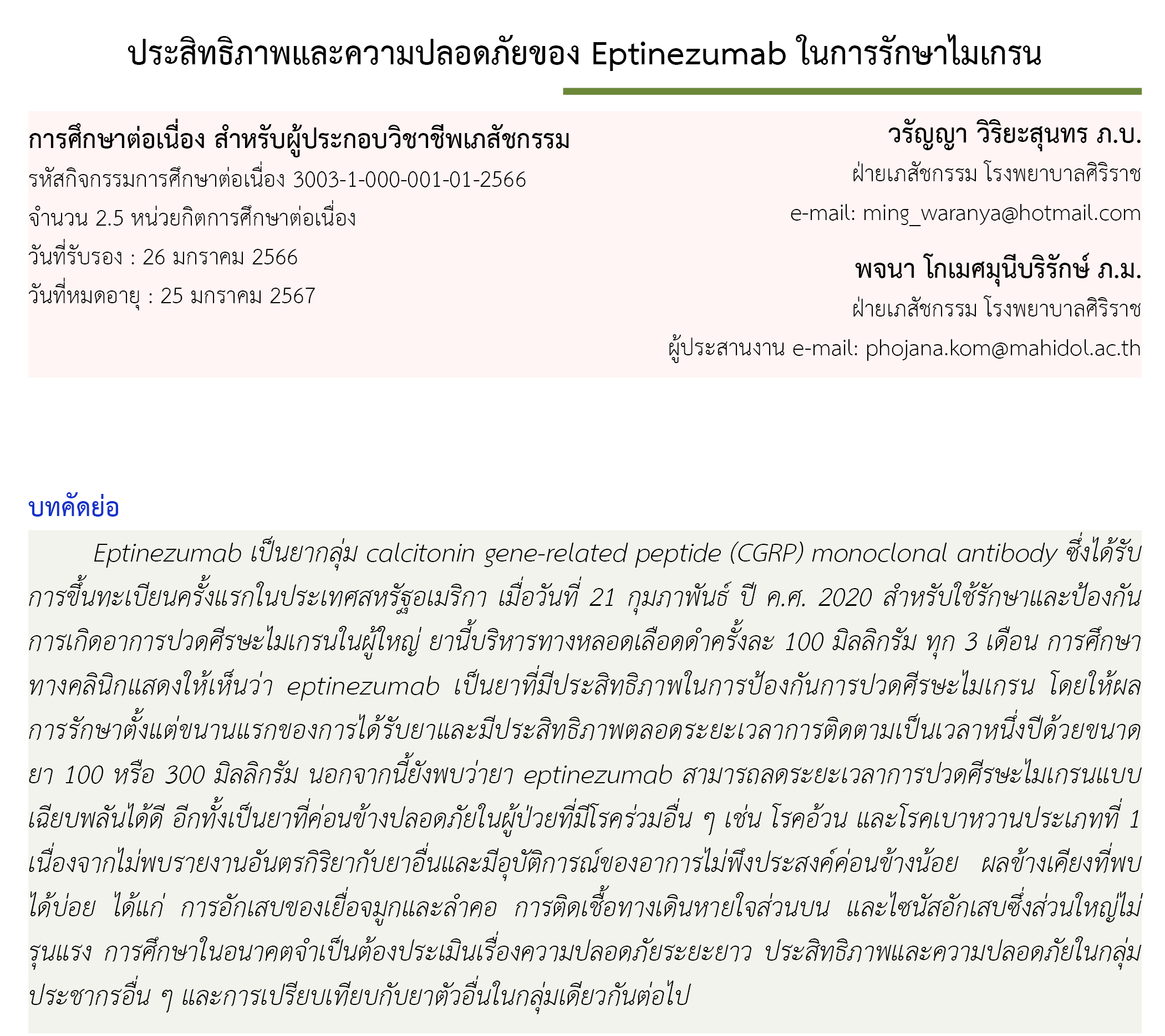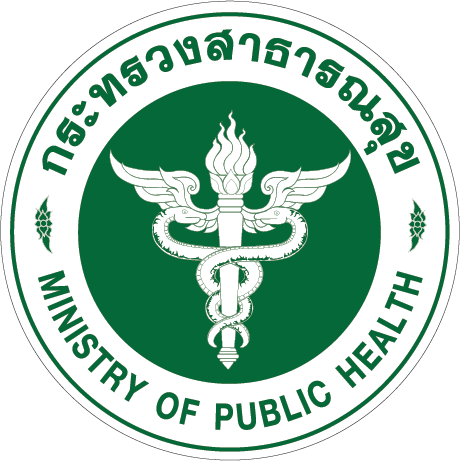Efficacy and Safety of Eptinezumab in Migraine Treatment
Keywords:
eptinezumab, calcitonin gene-related peptide monoclonal antibody, CGRP, migraineAbstract
Eptinezumab, a calcitonin gene-related peptide (CGRP) monoclonal antibody, was approved for the first time in the USA on 21 February 2020 for the prevention and treatment of migraine in adults. Eptinezumab 100 mg is administered intravenously every 3 months. Clinical studies have shown that eptinezumab is effective for migraine prevention from the first dose of its administration and maintain its efficacy throughout a one-year follow-up period at doses of 100 mg or 300 mg. Additionally, eptinezumab was found to reduce the duration of acute migraine headache. It is relatively safe for patients with other comorbidities such as obesity and type 1 diabetes patints because of no reported drug interaction and infrequent reported adverse events. The common adverse events were nasopharyngitis, upper respiratory tract infections, and sinusitis which were not serious. Further studies to evaluate the long-term safety, efficacy and safety in diverse populations, and the comparison with the other drugs of its class are necessary.
References
Lundbeck Seattle BioPharmaceuticals, Inc. VYEPTITM (eptinezumab-jjmr) injection [Internet]. Washington; 2020 [cited 2022 Sep 1]. Available from: https://www.accessdata.fda.gov/drugsatfda_docs/label/2020/761119s000lbl.pdf
Morgan KW, Joyner KR. Eptinezumab: a calcitonin gene-related peptide monoclonal antibody infusion for migraine prevention. SAGE Open Med. 2021;9:1-8.
Dhillon S. Eptinezumab: first approval. Drugs. 2020;80(7):733-9.
Datta A, Maryala S, John R. A review of eptinezumab use in migraine. Cureus. 2021;13(9):e18032. doi: 10.7759/cureus.18032.
Scuteri D, Adornetto A, Rombolà L, Naturale MD, Morrone LA, Bagetta G, et al. New trends in migraine pharmacology: targeting calcitonin gene–related peptide (CGRP) with monoclonal antibodies. Front Pharmaco. 2019;10:363.
Ashina M, Saper J, Cady R, Schaeffler BA, Biondi DM, Hirman J, et al. Eptinezumab in episodic migraine: a randomized, double-blind, placebo-controlled study (PROMISE-1). Cephalalgia. 2020;40(3):241–54.
Lipton RB, Goadsby PJ, Smith J, Schaeffler BA, Biondi DM, Hirman J, et al. Efficacy and safety of eptinezumab in patients with chronic migraine: PROMISE-2. Neurology. 2020;94(13):e1365–77. doi: 10.1212/WNL.0000000000009169.
Diener H, Marmura MJ, Tepper SJ, Cowan R, Starling AJ, Diamond ML, et al. Efficacy, tolerability, and safety of eptinezumab in patients with a dual diagnosis of chronic migraine and medication-overuse headache: subgroup analysis of PROMISE‐2. Headache. 2021;61(1):125–36.
Kudrow D, Cady RK, Allan B, Pederson SM, Hirman J, Mehta LR, et al. Long-term safety and tolerability of eptinezumab in patients with chronic migraine: a 2-year, open-label, phase 3 trial. BMC Neurology. 2021;21(1):126.
Winner PK, McAllister P, Chakhava G, Ailani J, Ettrup A, Krog Josiassen M, et al. Effects of intravenous eptinezumab vs placebo on headache pain and most bothersome symptom when initiated during a migraine attack: a randomized clinical trial. JAMA. 2021;325(23):2348-56.
Baker B, Schaeffler B, Hirman J, Hompesch M, Pederson S, Smith J. Tolerability of eptinezumab in overweight, obese or type 1 diabetes patients. Endocrinol Diabetes Metab. 2021;4(2):e00217. doi: 10.1002/edm2.217.

Downloads
Published
How to Cite
Issue
Section
License
Copyright (c) 2023 Health Administration Division, Office of the Permanent Secretary, Ministry of Public Health and The Society of Hospital Pharmacist, Ministry of Public Health

This work is licensed under a Creative Commons Attribution-NonCommercial-NoDerivatives 4.0 International License.
ข้อความภายในบทความที่ตีพิมพ์ในวารสารเภสัชกรรมคลินิกทั้งหมด รวมถึงรูปภาพประกอบ ตาราง เป็นลิขสิทธิ์ของกองบริหารการสาธารณสุข สำนักงานปลัดกระทรวงสาธารณสุข และ ชมรมเภสัชกรโรงพยาบาลกระทรวงสาธารณสุข การนำเนื้อหา ข้อความหรือข้อคิดเห็น รูปภาพ ตาราง ของบทความไปจัดพิมพ์เผยแพร่ในรูปแบบต่าง ๆ เพื่อใช้ประโยชน์ในเชิงพาณิชย์ ต้องได้รับอนุญาตจากกองบรรณาธิการวารสารเภสัชกรรมคลินิกอย่างเป็นลายลักษณ์อักษร
กองบริหารการสาธารณสุข สำนักงานปลัดกระทรวงสาธารณสุข และ ชมรมเภสัชกรโรงพยาบาลกระทรวงสาธารณสุข อนุญาตให้สามารถนำไฟล์บทความไปใช้ประโยชน์และเผยแพร่ต่อได้ โดยอยู่ภายใต้เงื่อนไขสัญญาอนุญาตครีเอทีฟคอมมอน (Creative Commons License: CC) โดย ต้องแสดงที่มาจากวารสาร – ไม่ใช้เพื่อการค้า – ห้ามแก้ไขดัดแปลง, Attribution-NonCommercial-NoDerivatives 4.0 International (CC BY-NC-ND 4.0)
ข้อความที่ปรากฏในบทความในวารสารเป็นความคิดเห็นส่วนตัวของผู้เขียนแต่ละท่านไม่เกี่ยวข้องกับกองบริหารการสาธารณสุข สำนักงานปลัดกระทรวงสาธารณสุข และ ชมรมเภสัชกรโรงพยาบาลกระทรวงสาธารณสุข และบุคลากรในกองฯ หรือ ชมรมฯ แต่อย่างใด ความรับผิดชอบองค์ประกอบทั้งหมดของบทความแต่ละเรื่องเป็นของผู้เขียนแต่ละท่าน หากมีความผิดพลาดใด ๆ ผู้เขียนแต่ละท่านจะรับผิดชอบบทความของตนเอง ตลอดจนความรับผิดชอบด้านเนื้อหาและการตรวจร่างบทความเป็นของผู้เขียน ไม่เกี่ยวข้องกับกองบรรณาธิการ



